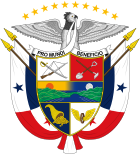Politics of Panama
This article has multiple issues. Please help improve it or discuss these issues on the talk page. (Learn how and when to remove these template messages)
|
 |
|---|
The politics of Panama take place in a framework of a presidential representative democratic republic with multi-party system, whereby the President of Panama is both head of state and head of government.
Executive power is exercised by the government. Legislative power is vested in National Assembly. The Judiciary is independent of the executive and the legislature. The branches are according to Panama's Political Constitution of 1972, reformed by the Actos Reformatorios of 1978 and the Acto Constitucional of 1983, united in cooperation and limited through a system of checks and balances
Three independent organizations with clearly defined responsibilities are found in the constitution: the Comptroller General of the Republic has the responsibility to manage public funds; the Electoral Tribunal has the responsibility to guarantee liberty, transparency, and the efficacy of the popular vote; and the Ministry of the Public oversees interests of State and of the municipalities.
Executive branch
| Office | Name | Party | Since |
|---|---|---|---|
| President | Juan Carlos Varela | Panameñista Party | 1 July 2014 |
| Vice President | Isabel Saint Malo | Panameñista Party | 1 July 2014 |
The Executive Branch includes a president, one vice-president and government. President and vice-president are elected on a single ballot for one non-renewable five-year term by direct popular vote.
State Ministers
- Minister of Agricultural and Livestock Development: Jorge Arango
- Minister of Canal Affairs: Roberto Roy
- Minister of Commerce and Industries: Augusto R. Arosemena M.
- Minister of Economy and Finance: Dulcidio de la Guardia
- Minister of Education: Marcela Paredes de Vásquez
- Minister of Environment
- Minister of Foreign Affairs: Isabel Saint Malo
- Minister of Health: Francisco Javier Terrientes
- Minister of Housing: Mario Etchelecu
- Minister of Government: Milton Henríquez
- Minister of the Presidency: Álvaro Alemán
- Minister of Public Security: Rodolfo Aguilera
- Minister of Public Works: Ramón Arosemena
- Minister of Social Development: Alcibiades Vásquez
- Minister of Work and Labor Development: Luis Ernesto Carles
- Attorney General: Kenia Isolda Porcell Alvarado
- Manager, National Bank of Panama: Rolando Julio de León Alba
- Permanent Representative to the United Nations, New York: Pablo Antonio Thalassinós
(Source: CIA World Factbook: World Leaders, Panama)
Legislative branch

The legislative branch consists of a unicameral National Assembly (Asamblea Nacional), composed of 71 members elected to five-year terms from single- and multi-seat constituencies.
Judiciary
The Judicial Organ administers justice in a permanent, free, and expeditious manner. It comprises the Supreme Court of Justice, the Tribunals, and the judges established by law, according to the constitution of Panama (title VII, chapter 1).
Elections
An autonomous Electoral Tribunal supervises voter registration, the election process, and the activities of political parties. Everyone over the age of 18 is required to vote, although those who fail to do so are not penalized.
Template:Panamanian presidential election, 2009
Political culture
The dominant political parties in Panamanian history have been the PRD and the Panameñista (former Arnulfista Party). These parties were founded by charismatic and strong political enemies, Omar Torrijos (PRD)—the deceased father of the previous president, Martín Torrijos—and Arnulfo Arias (Panameñista/Arnulfista), late husband of the ex-president, Mireya Moscoso. Even though these leaders died years ago, their aura is revived by their followers, and they are present in every election.
Panamanian politics have historically been corrupt.[citation needed] Lately, the Panamanian society and press are auditing and fighting for improvements. A sign of this is the lack of young votes in the referendum of October 22, 2006, showing a lack of confidence in Panamanian politics and politicians.
See also
References
Further reading
- Harding, Robert C. (2001). Military Foundations of Panamanian Politics. Transaction Publishers. ISBN 978-0-7658-0075-6.
- Harding, Robert C. (2006). The History of Panama. Greenwood Publishing. ISBN 978-0-313-33322-4.

